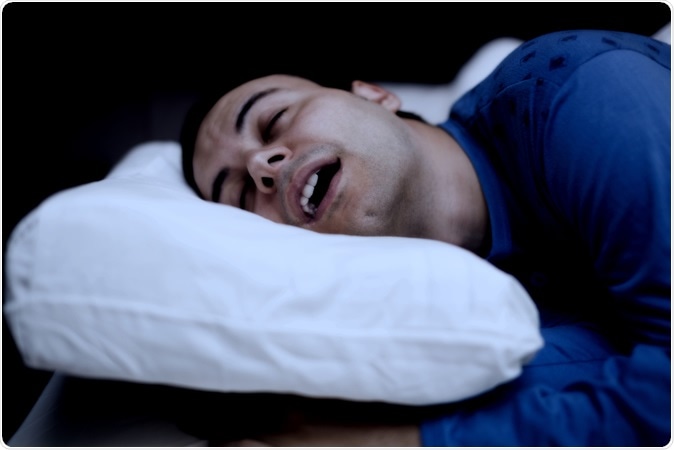According to new research, persons getting less amounts of rapid eye movement (REM) sleep may be at greater risks of developing dementia. The study entitled “Sleep architecture and the risk of incident dementia in the community” was published yesterday in the online issue of Neurology, the medical journal of the American Academy of Neurology.

Less REM sleep connected to greater risk of dementia finds study. Image Credit: By Minerva Studio / Shutterstock
Sleep phases and what is REM sleep?
Sleep is a state where awareness to environmental stimuli is reduced. Like most other mammals, humans also show two types of sleep :-
- non-rapid eye movement (NREM) sleep
- rapid eye movement (REM)
Once the sleep sets in there are four stages of sleep.
- Stage 1 sleep is the initial NREM phase. Eye movements slow down and muscle tone decreases. During stage 1 the person is aware of the surroundings and may be roused easily. There may be sudden muscle contractions and a sense of falling or dreams.
- Stage 1 lasts for a few minutes before progressing to stage 2. This is also an NREM stage and is the beginning of sleep as perceived by the person.
- Stage 2 is followed by stages 3 and 4. Stage 3 and 4 are also referred to as slow wave sleep (SWS), delta sleep, or deep sleep. Arousal at this stage is difficult. Eye movements reduce as the person progresses from stages 2 to 4. Muscle tone also diminishes
- After stages 1 to 4 of NREM sleep comes REM sleep. The eyes move rapidly in bursts and there may be muscle twitches. Dreams occur in the REM phase
Dementia
Dementia is a combination of several symptoms that are associated with the declining abilities of the brain and its functions. There may be a decline in thinking, memory, cognition, language skills, understanding and judgment. Over time people with dementia worsen and may have problems controlling their emotions or behaviour. They may eventually become apathetic to their surroundings. The cause of dementia lies in the damage to the structure of the brain.
Latest study connects the two
Study author Matthew P. Pase, of Swinburne University of Technology in Australia explained that there has been little scientific evidence that assesses the role of the various phases of sleep and connects it with dementia risk. This study was planned to see if any phase of sleep or its lack could be connected to increasing the risk of dementia.
The team of researchers thus looked at 321 people of an average age of 67 from Massachusetts. This group had participated in the earlier Framingham Heart Study. The sleep cycles and patterns of each of the participants were measured using polysomnography machines at home of these participants. On an average the sleep data from the patients was gathered for 12 years. The participants were followed up for a maximum of 19 years. During this time, 32 participants developed dementia and 24 were found to have developed Alzheimer’s disease.
The researchers then looked at the connection and found that those who developed dementia spent 17% of their sleep time in REM sleep mode while those who did not get dementia got 20% REM sleep. Two factors raised the risk of dementia in these persons – less time in REM sleep and longer time to get to REM sleep. Dementia risk rose by 9% for every 1% reduction in REM sleep found the research team. The research team was meticulous in adjusting their statistical analysis for other factors such as age, gender, presence of heart disease, depression or usage of medications etc. They also noted that NREM sleep stages and their alterations were not associated with dementia.
Pase added that the next step in research would be to understand how lower REM sleep contributes to increased dementia risk. He hoped that this connection could be one way in which dementia risk could be identified early and steps might be taken to reduce the risk or prevent or delay the onset of dementia. The authors of the study write that more number of participants or larger studies are needed to confirm these findings.